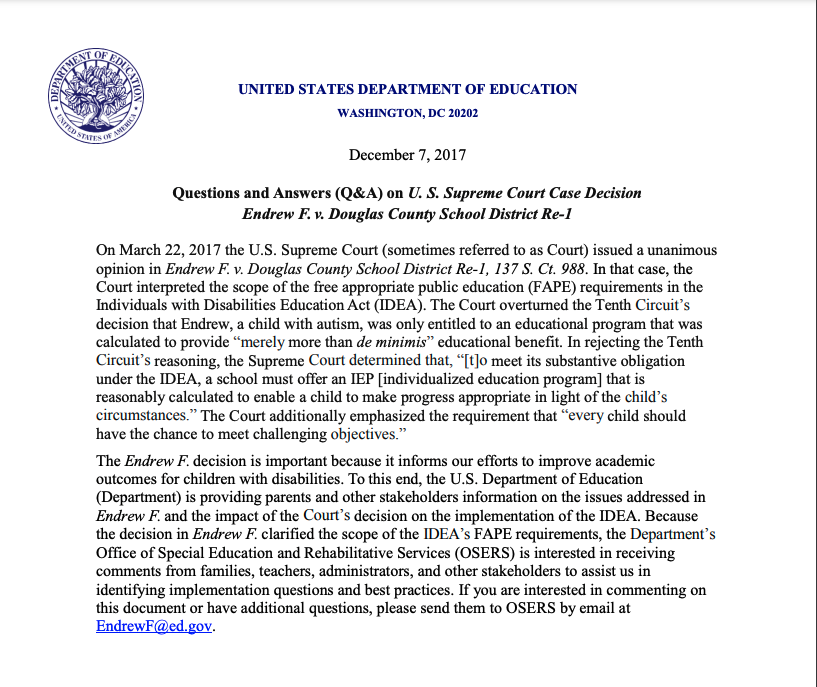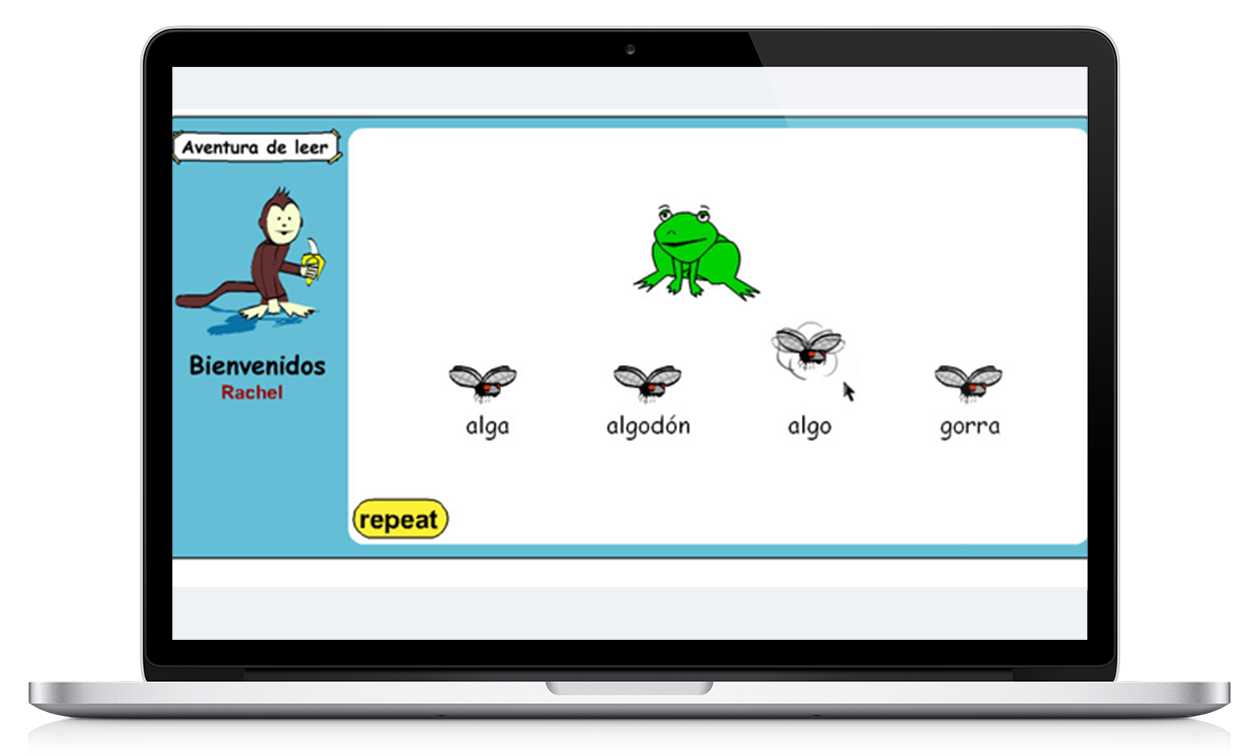As I travel the country and meet with special educators, a few themes always arise. The more often I meet with these men and women, the more my heart breaks. The locations differ, but the story never changes. Special educators are tired, overwhelmed, overworked, under-appreciated, under-supported, fearful to speak up, and quite often confused as to the specifics of their job description. The only consistently positive thread in these conversations is teachers’ love for and commitment to their students. Instead of technology and innovation making life easier for educators and directors of special education, it appears the job is becoming harder and more stressful. There is nowhere to hide; it is hard all over.
If we continue at this rate, our teacher shortage will grow and we will soon have no one to teach our most vulnerable students. We are at a crossroads. With the higher standard of the Endrew F. (2017) case beginning to bear down and increasing heat from state assessments, being a special education teacher has never been more challenging. Something has to give; it is time we stand up for and support our special educators. The time is now.
Explore more topics in special education
Time to Trust Our Professionals in Special Education
It’s time we started trusting special educators. Special education is bar none the most legalistic and closely governed area of education today. It falls smack dab in the middle of an educational system that is becoming more prescriptive and controlling, including highly detailed state standards and accountability measures. Special education is for the most part unfunded by the federal government, and it comes with the additional burden of legalese that brings more stress and more paperwork. Teachers are required by law to meet the high expectations of IDEA, but they are given neither the time nor the resources to aptly address all the requirements. It is a small miracle that our special educators are able to accomplish as much as they do, given how few resources they are provided. With all the tightly governed procedures of IDEA and the volume of prescriptive standards telling our teachers exactly what to teach — what is the message we are sending? There is generally a direct relationship between trust and how tightly a person is managed. In short, by mandating the what, how, when, and why of everything in our special educators’ day, we are broadcasting how little we trust their professional judgment. It is time we let these educators know we trust them and give them more autonomy over what they teach and how they provide their services. These are highly trained professionals who deserve our respect.
Support Our Teachers to Make Them Great
It’s time we supported our special educators at the classroom level. It is not uncommon for special education teachers to come into the business with little to no experience, little to no academic background in special education, and little to no hands-on professional development. To make matters worse, when these teachers enter the building for their first week of school, they are often given very little training (beyond what is in the faculty handbook) with regard to IEP writing, teaching, data collection, and research-based best practices.

For the most part, we are throwing them into the deep end of the pool and hoping they swim. As a wise person once said, “Hope is not a strategy.” There is no other professional in the educational enterprise who is regularly put in a more precarious situation and set up to fail than the special educator. It’s time we provided these professionals with high-quality, pre-service, and ongoing professional development and instructional support. We must provide them with tools if we expect them to develop truly meaningful and individualized educational programs for our children.

More Time to Plan and Collaborate
It’s time we give special educators the time and support they need to do their jobs. Too often schools give special educators one planning period and a 25-minute lunch break. Lunchtime becomes another work period for these teachers, as they grade papers and write IEPs while eating at their desk. At a minimum, special educators need a full planning period for special education-related responsibilities, in addition to a regular planning period for instruction and collaborative planning with other educators. We often speak of the legal requirements and high standards of quality demanded by IEPs, as well as the high degree of individualization and personalization we expect for every child in special education; however, we don’t provide the people doing the work with the tools or the time to create such products and programs. It is time we ended this nonsense and provided special education teachers with a full, unfettered planning period for special education requirements.
Fully Fund Special Education
It’s time we paid our special educators a livable wage and incentivized a new generation of educators to enter the field. Too often, special education teachers fund not only their own supplies but also those of many of their students. Too often they are forced to make do with what resources and tools they can find to do their jobs. It is time for teachers to stop having to pay to complete basic functions of their job. It makes me sad to think of these educators, a quarter of whom are estimated to have second jobs, paying out of their pockets to meet their basic needs as teachers. Is this what we want as American citizens?

Is this what we envision when we think of funding our priorities as a country? It is time to fully fund these educators and send a message that the American people care about special education teachers and students. It is time that Congress steps up and accepts its basic responsibility to fund the unrealized mandate that is IDEA. It is time to release special educators from the burden of working nights and weekends, resorting to on-the-side hustles to pay their bills and take care of their students. We should be ashamed that we have put educators in this position. I find it appalling how many teachers are forced to take second jobs just to pay the bills. From an economic standpoint, it makes sense to pay teachers – and special educators in particular – more money. If we truly value teachers, then we should want to recruit and retain the best of the best. We are currently experiencing a major shortage of teachers in special education. Most principals will tell you, “The only thing harder than finding a qualified math teacher is finding a qualified special education teacher.” This is basic economics: supply and demand. If we continue to pay at the current rate, we will continue to have a shortage of special educators. If we pay more and provide meaningful incentives, such as immediate loan forgiveness and signing bonuses, we will see a growth in supply. We have no problem with executives, physicians, attorneys, and bankers making six-figure salaries and receiving major signing bonuses; why should we balk at paying teachers more money? The time is now to pay these special educators what they are worth!
Fund Tools Designed for Special Education
It’s time for services and solutions that fit the workflow of special education teachers. There is no shortage of Ed Tech solutions and products. The problem, however, is that many of the folks in the Ed Tech industry have never spent time as special educators and don’t understand the struggles at the classroom level. It is hard to create a solution for a problem you’ve never experienced.
There are many quality products out there, but few fall into the workflow of everyday special educators and actually make their lives easier. The Ed Tech industry should commit itself to employing teachers and administrators who understand the actual work. They need to develop workflow-based products that truly lighten the load and help teachers perform their jobs more easily. The Ed Tech industry has much work to do to meet the needs of special educators. It is time for technology and products to work for special educators, not the other way around.
Ironically, tools for special education often work better than generalized instruction tools used in general education. When the general classroom fails to teach students, they often fall into the realm of the special educator. Therefore, funding special education workflows means improving overall workflows, as these tools spread the effective implementation of personalized learning. Effective special education departments lead to more effective Tier 2 or interventions for students without IEPs.
Expand Funding Today
It’s time we funded special education at the state level and supported directors of special education. The only people in a potentially more difficult spot than special education teachers are special education directors. In many respects, their daily lives involve a battle against overwhelming challenges with very limited tools and resources. As IDEA has never been funded over 15% by Congress, special education directors are forced to make do with what they have. Non-compliance is not an option. Not doing their best is not within their moral compass. Not doing right by kids is not in their vernacular. Most special education directors are lifelong educators of one sort or another. As we are burning out teachers, we are also systematically running great directors out of the business. Why? Because we have placed them in a no-win situation. It is time we provided them with the funds, resources, and tools necessary to appropriately staff and source their programs. Special education directors often take the blame for inadequacies in education, coming under attack by advocates and attorneys. They are forced to live in fear of the next court case or due process hearing. If Congress continues to refuse to do its part, then each individual state should step up to fully fund special education and give these directors the basic tools they need to take care of teachers and children.
If we are to truly and broadly support special educators, we must also address the issue of over-representation of children of color and those living in poverty in special education. For too long, we have failed to appropriately personalize and address the needs of those children who are not identified as “special education” candidates but who find themselves multiple years behind in multiple subjects. If we are to have true equity and parity among all children, we must better fund MTSS programs and those that will target general education supports and interventions. We must not only protect special education students, but also fiercely protect all at-risk and vulnerable children.
Supporting Special Education Today
It’s time we listened to our collective conscience and did the right thing. As a community of educators, leaders, parents, and advocates, we must come together to support our most valuable resources in the school environment today: special educators. If we provide special educators with the tools, training, funding, support, and encouragement necessary to meet the spirit of IDEA and to truly meet the needs of all children, we will systematically make our country a better place to live. There is no greater moral imperative than to ensure the basic needs and educational rights of our children. It is time that we all step up and refuse to be quiet. It is time for our voices to be heard and for swift and exacting change to come about. It is simply time for us to do the right thing.





Leave A Comment